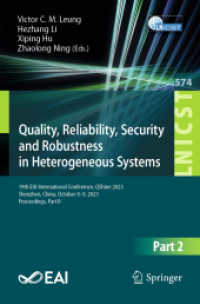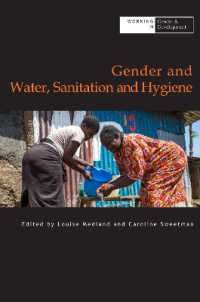- ホーム
- > 洋書
- > ドイツ書
- > Mathematics, Sciences & Technology
- > Technology
- > heat engineering, energy engineering, nuclear engineering
Full Description
This book introduces a comprehensive and sustainable project delivery framework tailored for managing the Water, Energy and Food (WEF) nexus in developing economies. Its primary objectives include establishing the determinants of the nexus, exploring the sustainability dynamics of the resources, delineating the role of digital technologies in WEF nexus projects, evaluating the interoperation of the three resources with sustainable development goals (SDGs) and subsequently formulating a sustainable project delivery framework. Timely in its release, the book provides essential policy directions and technological perspectives within the realms of sustainability.
Water, energy, and food (WEF) resources constitute vital components pivotal for a nation's socio-economic development and fundamental for human survival due to their intricate interdependencies. Recognizing their paramount importance, the World Economic Forum underscores their role in a country's growth trajectory. However, the sustainable management of WEF resources in the era of the Fourth Industrial Revolution necessitates an integrative framework for project delivery.
Unfortunately, a significant gap exists in understanding the determinants of the nexus between water, energy, and food resources, resulting in insecurity in their management. Compounding this challenge, the emergence of new technologies in the fourth industrial revolution has not received adequate consideration for ensuring resource security.
The book adopts a meticulous approach, conducting an in-depth review of existing models, frameworks, and theories. Furthermore, it supplements this analysis with an insightful interview case study. Notably, this pioneering work distinguishes itself as the first to view WEF resources as interconnected nexus projects, with a keen acknowledgment of the indispensable role played by digital technology. Moreover, its targeted focus on addressing the unique challenges prevalent in developing economies adds a layer of specificity often absent in existing literature on the WEF nexus. Researchers seeking a deeper understanding of the integration between the WEF nexus and digital technologies will find substantial value in the contents of this book.
The book is divided into five sections, providing a systematic exploration of the subject. The sections cover background information on WEF resources and its nexus, underpinning theories of resource interaction, theoretical frameworks relevant to the nexus, the role of digital technologies in managing the WEF nexus, interoperation of sustainability and SDG with the nexus, presentation of an in-depth case study and conclude with valuable insights and recommendations.
Contents
Chapter 1: General Introduction.- Chapter 2: General Description of WEF resources.- Chapter 3: Theories underpinning WEF nexus.- Chapter 4: Theoretical Frameworks of WEF nexus.- Chapter 5: Gaps in WEF nexus.- Chapter 6: WEF Nexus in South Africa.- Chapter 7: WEF Resources Nexus in Developing Economies.- Chapter 8: Role of Fourth Industrial Revolution (4IR) in WEF management.- Chapter 9: Application of Digital Technologies in WEF nexus.- Chapter 10: Conceptual Framework for WEF nexus.- Chapter 11: Validation of Sustainable Project Delivery Framework for WEF Nexus.- Chapter 12: WEF Nexus Project Sustainability.- Chapter 13: Conclusions and Recommendations.








